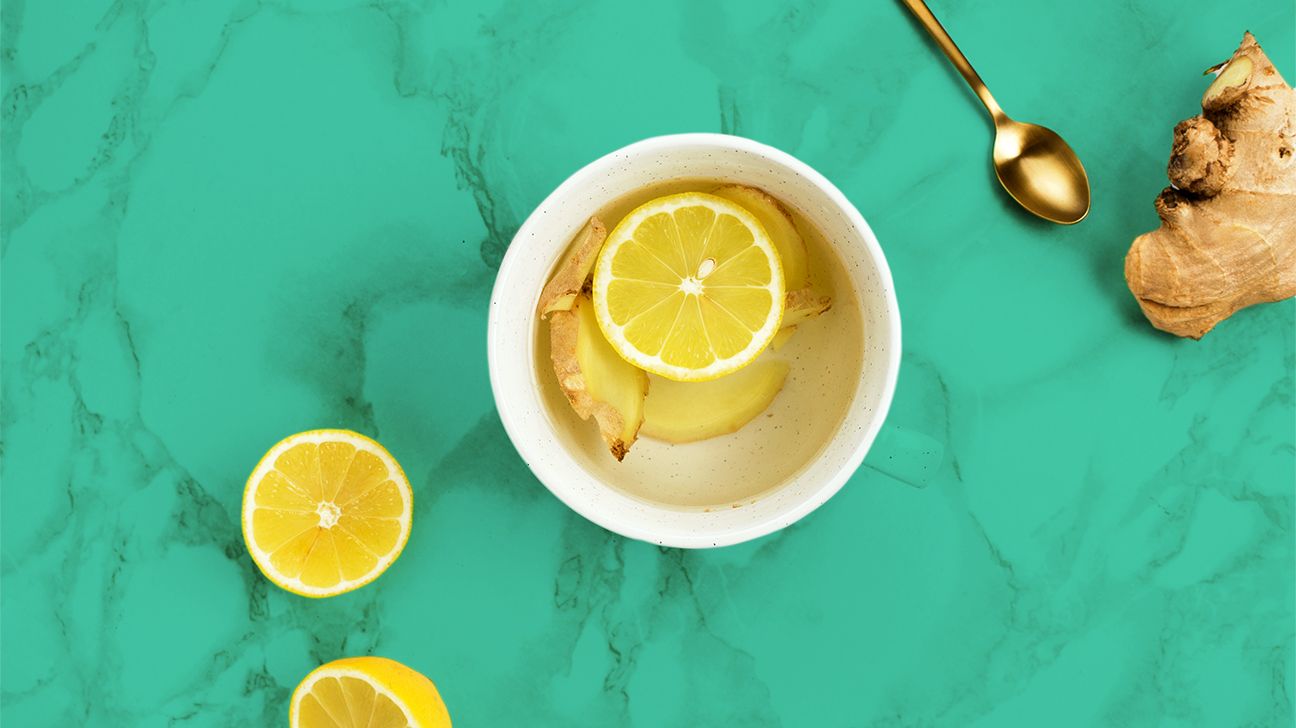Ginger water, AKA ginger tea, is easy to make at home. It may also help manage inflammation, regulate your blood sugar, and relieve digestive symptoms.
Technology may have brought us far, but the roots, herbs, and spices that provided the only medicinal aids for centuries can still be helpful today. And guess what? Root beer isn’t the only root worth drinking. If you’ve ever noticed a gnarly looking root at the grocery store, it was probably ginger.
The benefits of ginger water span from anti-inflammatory aid to blood sugar management.
But what exactly is ginger water? It’s nothing magical or mystical. Cue the drum roll: It’s ginger tea. You can buy tea bags at the store, but some commercial teas have other additives or are made with ginger flavoring (lame), so you don’t get all the health boosts of natural ginger.
As fancy as ginger water sounds, it’s super easy to make yourself.
There’s even a recipe at the end! Ginger may not be your cup of tea *wink, wink* but you don’t have to drink ginger water alone to soak up the benefits. Honey or lemon ginger water packs a healthy punch, too, and is super flavorful to boot.

Ginger comes in many forms, including capsules, powders, and ointments. We’re putting a magnifying glass on ginger water, but the scientific literature spans all forms of ginger. Some of the pros of ginger water may be more or less potent based on drinking it in tea form.
1. Curb that appetite
Many teas have been found to assist appetite control. Researchers in a 2019 study found that ginger contained several properties, like regulating lipid metabolism and moving glucose to the liver, that aid weight management.
Before you jump on the ginger diet wagon, these particular findings came from studying rats. Yes, rats’ responses mimic humans, but their bodies don’t respond exactly like ours. Ginger water could be helpful, but any solid weight loss plan also includes healthy eating and plenty of exercise.
2. Diabetes management
In a 2015 study, ginger powder showed potential in managing diabetes by improving fasting blood sugar and other key diabetic indicators. The study only had 41 participants and they used 2 grams of ginger powder daily for 12 weeks, so there are certainly limits to the findings. However, regular use did reduce some of the side effects of diabetes.
3. Put out the flames
Ginger water also shows potential as an anti-oxidant and anti-inflammatory aid. Chronic inflammation rears its ugly head in a number of diseases like arthritis, diabetes, and Alzheimer’s disease. Preliminary evidence suggests that ginger puts the kibosh on certain inflammatory and cancer-inducing agents.
Fair warning, the evidence comes from a rat lab, but keep an open mind about the potential. You certainly can’t rely on ginger water alone to treat a major illness, but it could work alongside traditional remedies.
4. Pass the barf bag
Stomach upset? Ginger is a well-known natural anti-nausea and digestive aid. Many a pregnant woman has used ginger to calm the waves of morning sickness.
While scientists aren’t exactly sure why it works, they suspect some funky rhizomes, time and time again, ginger outperforms a placebo. If you’re feeling a little queasy or have an upset stomach, it’s certainly worth sipping a cup of tea.
Most natural herbs and supplements like ginger come with a few side effects. Ginger water may cause some yummy heartburn, lovely gas and bloating, an achy stomach, or burning in the mouth. None of those are very fun, but they’re also extremely rare.
Any supplement or natural remedy has the potential for weird or dangerous interactions with medication or vitamins. If you’re taking other supplements, prescriptions, or vitamins, talk to your doctor before adding ginger into the mix. You should also talk to your doctor if you have diabetes, high blood pressure, or any other condition with which the ginger could interact.
Too much ginger could put you on the fast track to unwanted side effects. Keep your ginger water consumption under 4 grams per day. If you take any other ginger supplements like a powder or pill, include that in your daily total.
The recipe below makes the equivalent of 1 gram of ginger with 4 cups of water. You’d have to drink 16 cups of water to take too much. So, as long as you’re not guzzling ginger water, you’ll be fine.
There are plenty of premade ginger teas. Some contain real ginger; others have imitation flavoring. If you want the most benefit (and the real deal), you can make your own ginger brew fairly easily.
Ginger water recipe
Regular grocery stores carry ginger root, so it’s not hard to find. It’s a root that looks like a root, so… expect it to look like a root. The following recipe makes an equivalent of one gram of ginger:
- Wash the ginger root.
- Zest 1/2 teaspoon of ginger. It’ll only take a small portion of the root.
- Boil 4 cups of water.
- When the water begins to boil, add the zested ginger.
- Remove the water from the stove.
- Let the ginger steep in the water for 10 minutes.
- Strain the ginger from the water.
- Add lemon or honey to taste (optional).
- Drink the ginger water hot or cold.
tl;dr
- Ginger water helps get rid of nausea and an upset stomach.
- Ginger water can help manage diabetes, inflammation, and appetite.
- Limit consumption of ginger water to 4 grams per day.
- Rare side effects may include a burning sensation in the mouth, upset stomach, gas, and heartburn.
- Make your own ginger water by adding zested ginger to boiling water and letting it steep for 10 minutes.

